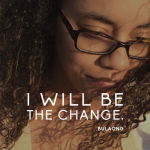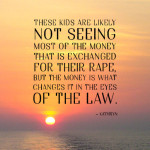A new show on A&E, “8 minutes,” follows a retired cop-turned-pastor Kevin Brown and his team of volunteers and advocates. Their mission is to provide resources to “possible victims of sex trafficking.” Kevin and his team set up in a hotel and he poses as a “John” to get them to the room. The team’s main goal is to get these women “out of the life.” The title of the show comes from Kevin Brown’s experience while in law enforcement. “The team believes that after eight minutes the chances of a violent interaction with a pimp increase exponentially.”
Initially weary of what I interpreted as a “savior complex,” I watched the show with a critical eye. Pastor Kevin is a white Christian man and ex-law enforcement turned pastor. Those labels possess a lot of privilege and power. I couldn’t help immediately thinking that his approach is very manipulative and hypocritical, even as he explains how most of these victims have been manipulated, and as we know, most likely coerced into this work,
Toni works closely with New Friends New Life, a nonprofit in Dallas that helps transition sex trafficking victims out of sex work and into a more stable lifestyle. The premise of only having eight minutes in the room made me skeptical, too, because of the nature of this work. It usually takes a long time for a sex trafficking victim to come forward due to lack of trust, self-blame, and training by the traffickers (source). I wondered if Pastor Kevin and his team might be helpful in some way, or if this show is just another form of exploitation.
With my limited knowledge and lack of personal experience, parts of his process made sense to me initially. I thought of the women in my own family who were abused, kidnapped, raped, addicted to drugs and fell into “the life.” I used to think if there was someone to pull them out and offer them resources, they would be “saved.”
Pastor Kevin’s own acknowledgement of his position of power, his need to build trust and connection, pleasantly surprised me. I thought, “Oh! He gets it” while still having slight moments of uneasiness and uncertainty about the dynamics in the show. While he talks about building trust between the women and the “8 Minutes” advocates, what he fails to mention is how with this process he is actually contributing to the manipulation and exploitation of these women. By trying to force them to make a decision in under eight minutes, he’s pressuring them and taking away their agency and power, which is the exact same pattern that abusers use. On top of this, he might be receiving some kind of monetary gain for it—though I don’t know this to be a fact.
Before they call a woman, the team of volunteers set up cameras and microphones in the hotel room, and the advocates watch and listen in an adjacent room until it’s time for one of them to talk to the woman. I have an issue with the fact that these women have no idea they are being recorded and watched. It was very unsettling to watch many of them bare their souls, while not knowing they were on camera.
Now, I want to recognize there are multiple truths when talking about sex trafficking and sex workers (an umbrella term for people in the sex industry). Are some people trapped in a cycle of victimization in the sex industry through physical, emotional, and psychological abuse? Yes. Are some sex workers consenting adults who work in the sex industry willingly? Yes.
There is a stigma around people, specifically women, who are sex workers, whether by force or by choice. There needs to be greater conversations about destigmatizing sex work. What I mean is, there needs to be greater awareness of what kind of factors are at play, while putting greater pressure on men to stop the demand.
Not to minimize this but to put it into perspective: I work on a college campus and time and time again I see underage students refuse to get help for an overly intoxicated friend because they fear they will be punished for drinking under twenty-one years of age rather than receive the help and support needed. This scenario parallels many stories we hear about sex workers and also survivors of rape, where there is this feeling that seeking support and resources will result in arrest or “victim blaming and shaming.” Unfortunately, these fears are well-founded.
“8 Minutes” raises more questions for me than answers. Besides the manipulative undertones, I have questions about what happens after the cameras shut off? There have been criticisms and numerous accounts as to the “reality” of this show. There have been claims that women in the show have not received promised resources and or they’ve been arrested shortly after their time on the show (source).
I have concerns about the authenticity seeing as Pastor Kevin sometimes arranges for an hour-long session with a worker but still rushes the “intervention” in 8-minutes. I worry that while this might be an aspect of sex work, it paints too narrow a picture of “prostitution” without discussing the many complexities of sex work and the people who partake in it. Lastly, there is very little agency given to the women. I am all for providing resources for people, especially those who are manipulated and abused, but I also want to honor the reality that women are often not given the space or trusted to make decisions for their bodies, family, and life if it doesn’t fit into what our male-dominated patriarchal society deems as “respectable.”
I want so badly to believe that the seemingly good intentions of Pastor Kevin and his advocates actually are doing more help than harm but I also must elevate the voices of sex workers who have taken to social media and other online forums to share their stories, experiences, and points of view about their work and this show. I want to challenge us to move forward with a critical eye and an open heart. I encourage us to think about how sometimes being well-intentioned can result in the harming of others. As my good friend Cody Charles wrote in his piece, Ten Counterproductive Behaviors of Well-Intentioned People, “Well-intentioned people make mistakes, lots of them. Mistakes must be expected and being held accountable has to be expected as well.”
After much public criticism, the show is no longer on the air. I don’t think this is a coincidence. And though it is a shame to take the spotlight off of a subject that needs to be explored and talked about, we must also continue to hold ourselves and others accountable as we work to create an equitable, accepting, and loving world for everyone.






